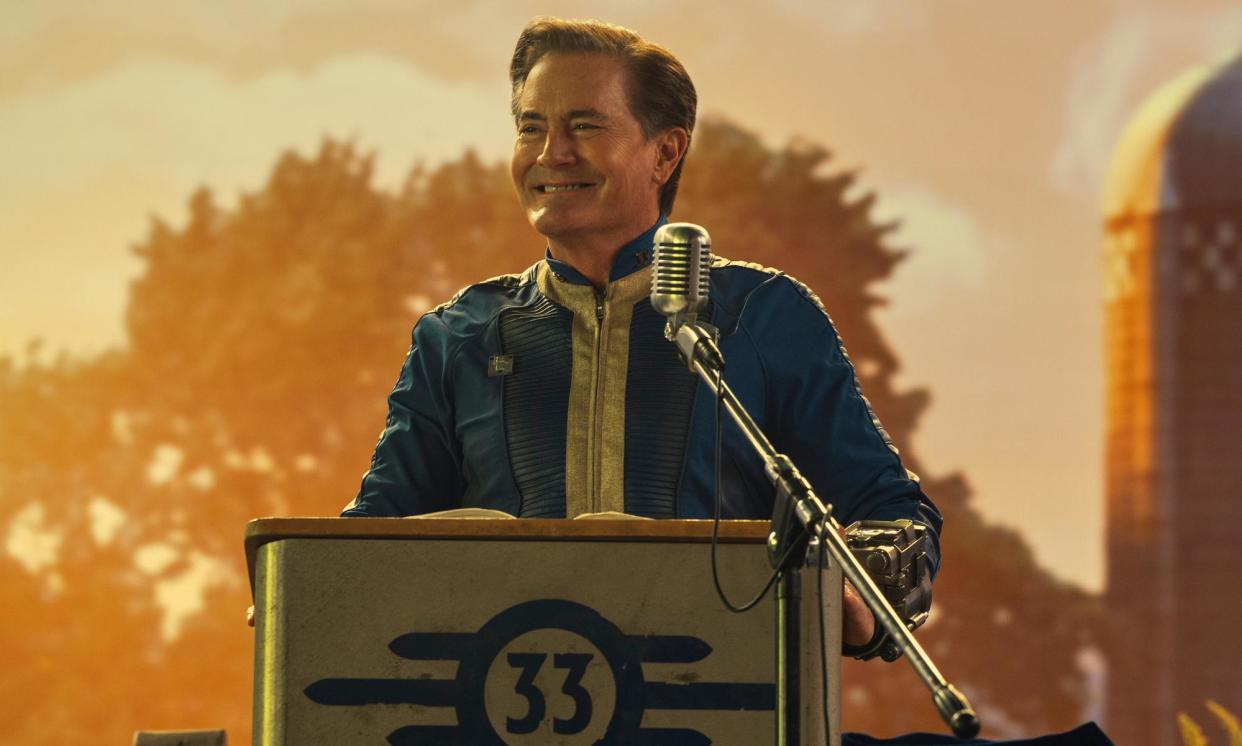Success of Fallout proves video game adaptations have gone mainstream

In the first few days of its release, Fallout – the Prime Video adaptation of the post-apocalyptic video game franchise – has become a hit with global audiences, shooting to the top of the UK chart and ranking among Prime’s top three most-watched titles ever.
On Friday, just a week after the show debuted in more than 240 countries and territories, Amazon announced it had renewed it for a second season. “The bar was high for lovers of this iconic video game and so far we seem to have exceeded their expectations, while bringing in millions of new fans to the franchise,” the streamer said.
The success of the show, which is set 200 years after a nuclear armageddon and stars Ella Purnell, Kyle MacLachlan and Aaron Moten, demonstrates the extent to which video game adaptations have improved in recent years and finally pierced the mainstream.
A slew of commercial and critical hits, including last year’s HBO series The Last of Us – which won eight Emmys – and The Super Mario Bros Movie – which made $1.36bn (£1.094bn) in the global box office – has led to market experts comparing them to Marvel adaptations, which have long been big moneymakers for studios.
“Game adaptations are the new superhero movies,” said Rhys Elliott, a games industry analyst at MiDiA Research. “Recent box office numbers, online sentiment and reviews for superhero movies signpost that consumers and critics alike are feeling superhero fatigue.
“But game adaptations offer an oasis for movie and TV studios. The huge box office numbers for last year’s Mario movie and high critic scores for shows like Fallout and The Last of Us are extremely telling. The games industry always understood the power of its IP, and now Hollywood and TV are finally beginning to understand.”
According to Elliot, the Super Mario Bros Movie was the biggest turning point for studios realising the potential of games. Not only was it the biggest game adaptation ever by revenues, but it was also the second-biggest animated movie, outperforming juggernauts such as Frozen and Despicable Me. On the TV front, shows such as The Witcher and Cyberpunk as well as The Last of Us and Fallout have shown that video game storylines can be part of the cultural zeitgeist outside of gaming.
The adaptation of Minecraft will be on screens next year, while a live-action film based on the Legend of Zelda franchise is in development and Margot Robbie is reportedly working on a The Sims movie.
“This is symbolic of the shift towards games IP, and the shift will only continue with each new success story. If studios weren’t paying attention to games before, they certainly are now,” Elliot said.
Video game fans have expressed relief that the so-called curse of the adaptation has been lifted. They attribute this to two things: modern adaptations sticking more closely to the tone of the games while expanding on the story, and studios spending money to secure some of the biggest actors and producers in film and TV.
Fallout, for instance, was able to speak to longtime fans of the games and newcomers by setting the story after the events of the game. Its producer and director, Jonathan Nolan, was given the reins to do this because he was previously obsessed with the game. “He had clearly played a lot,” said Todd Howard, the developer of the modern Fallout video games. “He could speak to it with authenticity and had a view of what made it tick.”
Related: ‘They even got a real jetpack in there!’: Todd Howard and Jonathan Nolan on Fallout
The Guardian’s video games editor, Keza MacDonald, wrote that Hollywood had abandoned its previous reservations. “In a single year, the Curse of the Terrible Video Game Adaptation has been so comprehensively broken that movie production companies now appear to be flinging themselves into something of a gold rush,” she said.
Rob Mitchell, the director of theatrical insights at Gower Street Analytics, said video game adaptations had been a regular part of Hollywood’s focus for several decades, dating back to at least the early 90s adaptations of Super Mario Bros and Street Fighter starring Jean-Claude Van Damme. Others have cited a litany of poor attempts (think Tomb Raider, Assassin’s Creed, Resident Evil or Max Payne).
But, Mitchell said, individual successes bolster confidence. “In that way you might liken the current positivity to the early 2000s, pre-MCU [Marvel Cinematic Universe] days of comic-book adaptations where the successes of films like X-Men and Spider-Man brought greater confidence in comic-books adaptations.
“However, where the MCU developed a singular, unified vision under the guidance of Kevin Feige [president of Marvel Studios], there is no apparent equivalent of that yet emerging behind video game properties.”
According to Mitchell, one of the key reasons producers were keen to tap into video games was their global recognition. For instance, 52.9% of the $291.5m box office revenue for last year’s hit horror film Five Nights at Freddy’s came from outside the US. This figure rose to 63.5% (of $407m) for Uncharted, starring Tom Holland, and 91.4% (of $312m) for Resident Evil: The Final Chapter. “Appealing to a global audience is the cornerstone of any successful franchise,” he said.
It was a sentiment echoed by Tim Richards, the chief executive of Vue cinemas, who said the key to adaptations’ success was their familiarity to a broad range of audiences.
“With video game adaptations, as with books adaptations and other material where there may be public recognition, it’s easier to launch because there’s already a recognisable name,” he said. “Look at Barbie, which has recognisable characters people grew up with and know and love. It’s about familiarity. I think we’re going to see more of that.”

 Yahoo News
Yahoo News 
